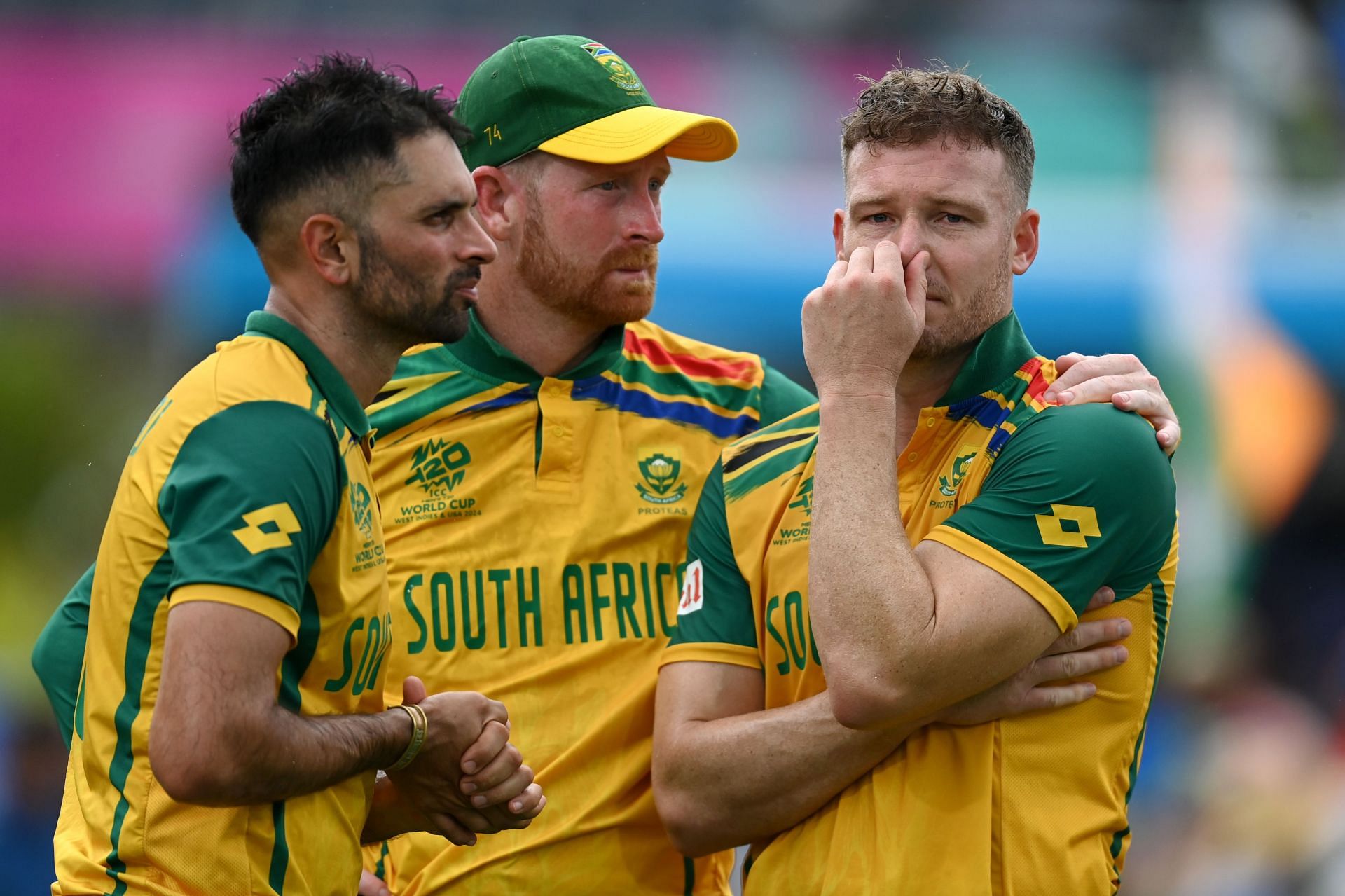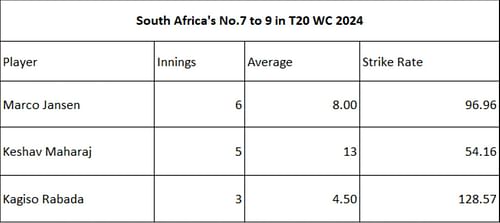
South Africa's finishing fortunes fade with uncharted fantasy in sight
Yes, 'Winning is a habit' reads the famous sporting quote. Yet, the following line, often skipped, comes to the forefront when the South African cricket team coughs up another World Cup knockout game - 'Unfortunately so is losing'.
With all the tormenting memories of the past gradually getting erased and a rejuvenation that had fans tout them as 'South Africa 2.0', they stumbled right on cue at the doorsteps of glory. The clutch gene displayed in the infinite close finishes during the 2024 T20 World Cup deserted them, and the customary C-word started doing the rounds again.
Playing with a chip on their shoulder as heavy underdogs against the much-fancied Indian outfit, the Proteas raced toward uncharted territories that had even their own fans in pleasant disbelief.
30 runs were needed off 30 deliveries with the two destroyers, Heinrich Klaasen and David Miller firing on all cylinders. Surely, South Africa 2.0 had this, and the rainbow nation's long-awaited celebrations were ready until it wasn't, yet again!
The habit of succumbing to such positions in the past reared its ugly head after hiding for the entire tournament to bring back all the pain and unerasable memories.
South Africa's seemingly unending wait for World Cup triumph goes on and on and on...
South Africa's denial to the mountain top - Choke job or fatal flaw?
The best parts of crunch World Cup knockout games are how they reveal or expose a side for who they are. Yet, South Africa's collapse from a convincing position in the last five overs against India in the grand finale has fans divided between calling it another trademark choke or an actual fatal flaw in the playing XI. History would suggest the former all the way.
But looking at the game in isolation reveals a massive flaw the Proteas somehow put to sleep throughout the competition before it finally woke up and spelt doom. Sure, there was some 'choking' when run-a-ball was needed off the final five overs with six wickets remaining.
However, in this instance, batting depth, a priority No.1 for most teams in this high-scoring era, haunted South Africa at the most inopportune time. Once Klaasen nicked to wicket-keeper Rishabh Pant, the writing was on the wall for the Proteas, in all honesty.
Is Marco Jansen a No. 7 or are Keshav Maharaj and Kagiso Rabada No. 8 or 9? For context, India boasts Axar Patel, Ravindra Jadeja, and Kuldeep Yadav in the same positions.
For answers, here are the numbers of South Africa's No. 7 to No. 9 in the 2024 T20 World Cup:

It demonstrates how the Proteas batters who were to close out the game had endured dismal averages and strike rates, with no previous reputation as finishers of tight run-chases.
There was only so long the Proteas could mask this liability within their ranks before it revealed itself on the big stage. Remember how England built their whole revolutionary brand of cricket on having capable batters till No. 11 and able finishers even at 7 and 8?
It enabled them to attack from the get-go with the safety valve of batting depth and subsequently win the ODI and T20 World Cups in 2019 and 2022, respectively. Even Rohit Sharma and Co. adopted a similar strategy to tremendous success during their victorious 2024 T20 World Cup campaign.
It was also South Africa's USP during their dominant run in the late 1990s and early 2000s, with Mark Boucher, Shaun Pollock, Lance Klusener, and Nicky Boje walking in from No. 7 to 10.
The current setup must look at bolstering their batting depth and not disregard the just-concluded final as another 'not their day' or 'lack of fortune' moment.
Questionable top-order batting and worrisome death bowling should not go unnoticed
While South Africa may have potentially the most destructive middle-order in the shortest format with Tristan Stubbs, Heinrich Klaasen, and David Miller, the combination of a shaky top and a lack of batting depth nullifies the trio's impact.
As the final five overs of South Africa's botched run-chase becomes the talking point over the next while, their top-order frailties must not go unnoticed. Quinton de Kock was a hit-and-miss throughout the 2024 T20 World Cup, averaging 27 in nine games.
However, on either side of De Kock, Reeza Hendricks and Aiden Makram ensured like clockwork that the Proteas started poorly. The former averaged a horrific 14.12 at a strike rate of 87.59, while skipper Markram put up an average and a strike rate of 15.37 and 100.81.
Even in the summit clash against India, the duo pushed South Africa on the back foot at 12/2 with their tame dismissals. The other issue South Africa overcame, thanks to bowler-friendly pitches in the Caribbean and the USA, was their worrisome death bowling.
However, on a placid track in Barbados, the Proteas end overs bowling fell apart as the Indian lower middle-order scored a massive 50 runs off the final four overs.
T20 cricket is a game of margins, and how costly those runs leaked in the death overs cannot be underestimated when the difference between celebration and introspection is seven runs.
And who better than South Africa to know how inches and finer margins decide World Cup destiny?
South Africa's 2024 T20 World Cup campaign - A success or failure?
When the 'chokers' term is bombarded all over social media, it is hard to connect success with South Africa's 2024 T20 World Cup campaign.
Yet, sports is all about narratives and storylines. A more intriguing one would be to focus on the final five overs against India and base the entire tournament solely on the same, with similar past endings adding the cherry on top of the cake.
But, some context should warrant a more glass-half-full perspective to South Africa's run through the tournament. A nation that hasn't sniffed a T20 World Cup semi-final since 2014 reached the final, and it was also their maiden appearance on that stage in a 32-year World Cup history.
Just that for a much younger and inexperienced side to those in the past should scream success. Add to that the way Markram's men overcame demons to win several tight games and remained unbeaten until the final.
Even in the final, the African side were in total control after 35 overs, i.e., almost 90% of the contest before the inevitable slip-up. Finally, after the dust settled in on the summit clash, South Africa's skipper summed up their thrill-a-minute campaign.
"I think one thing that I will definitely say is how proud we are. Not just of today, the game itself, but the competition as a whole, the build-up to get here. So, in hindsight, the things will still feel really good about this competition. But like I mentioned, just for the time being, it stings a bit, but it's good for it to sting. It gives you that little bit of fire in the belly for next time that you're here," said Markram.
He added:
"But yeah, we'd like to think we're one step closer and hopefully moving forward we can get that first win and it can be a snowball effect of quite a few to come."
To conclude, South Africa's 2024 T20 World Cup journey was potentially a 'so near yet so far' and a golden opportunity that may never come back again.
Yet, a more optimistic way to look at it would be from Markam's lenses - A successful run that culminated inches from ultimate glory, yet adding fuel to the fire for their next World Cup episode.
Until then, what the 'C' in the C-word stands for based on the 2024 T20 World Cup is up to each one's discretion. But for Markram and his men, until they are at the podium with the C-word echoing 'Champions' showered at them someday, only the 'Ch' followed by an 'o' instead of 'a' will reverberate.